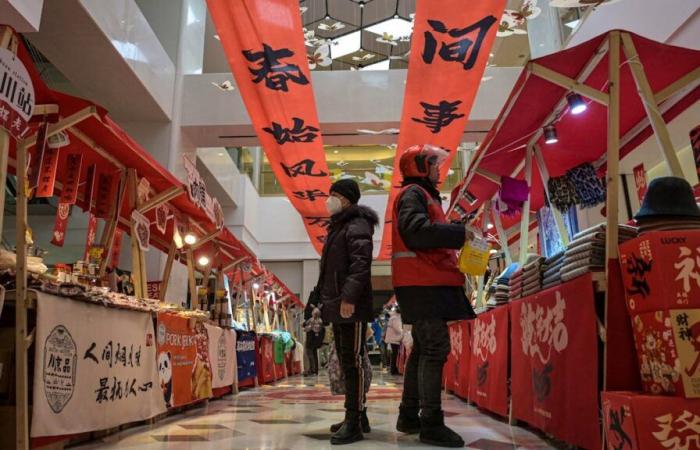An almost empty shopping center in Beijing testifies to the pessimism of the population.
AFP
Chilly consumers, deserted businesses and a general feeling that the economy is not picking up: in the streets of Beijing, the population remains pessimistic while the country announced on Friday one of the weakest growth in recent decades.
China officially recorded growth of 5% in its gross domestic product (GDP) in 2024, the weakest pace in three decades excluding the pandemic period, according to government figures.
This figure is consistent with the very political objective of “around 5%” repeated by Chinese leaders, but several analysts invite us to consider it with caution in view of the structural difficulties of the world’s second largest economy.
“Obstacles and challenges”
The authorities also recognized that the situation remained fraught with “obstacles and challenges”, even if the official comments mainly underlined the “success” of these results and the “remarkable recovery” of the national economy.
Far from this triumphalist tone, in the icy streets of Beijing, the optimist is not there. “The economy has clearly declined,” Yang Aihua, a 35-year-old tea seller from the central province of Hubei, told AFP.
“There is no money”
“There is a fear of consuming and spending, because there is no money,” she adds.
The merchant explains that the number of visitors to her shop has dropped significantly, and that the customers who still came were spending less: “For us merchants, it is obvious that there are many fewer customers (…), the level of consumption has nothing to do with before.
Declining confidence
For Guo Jian, an employee in the oil and petrochemical sector, consumer confidence has clearly declined after the rebound following the end of restrictions linked to the covid-19 pandemic.
“Consumption levels are lower than before,” notes this fifty-year-old from the Shaanxi province (north). People limit “their large purchases or unnecessary purchases,” he observes.
The low level of domestic consumption, although a driver of consumption for years, has become a major concern for the authorities.
Retail sales have clearly run out of steam, increasing by only 3.5% last year compared to an increase of more than 7% in 2023, as worried households prefer to postpone their purchases, especially as the job market darkens. .
-Grant Program
Since last year, Beijing has increased initiatives to stimulate spending, such as the expansion last week of a subsidy program for the purchase of household products – ranging from water purifiers to electric cars. .
But that doesn’t stop shopkeeper Yang Aihua from remaining cautious about her purchases. “I’m afraid of spending without thinking,” she says.
“Before, I might have bought handbags. But today, I clearly feel that I earn less, so I cannot spend as much as before,” she explains.
A few steps away, Li Chunyu, a cleaning worker, judges that this drop in purchasing power concerns her less: “We are workers, we earn the basic salary, the lowest”, so “we don’t think so much to consume,” she recalls.
The advantage of being in the capital
Li Chunyu, who says she arrived in Beijing ten years ago, acknowledges that work has slowed down during the pandemic. But she believes that the vibrant Chinese capital still contains more opportunities than her hometown, located in the neighboring province of Hebei: “If it were that difficult, or if I couldn’t take it anymore, I wouldn’t have stayed so long, isn’t it?”
The pace of growth of the Chinese economy is enough to make most rich countries pale, which are stagnating around +1% annual growth.
But it remains far from the double-digit growth rates of the 2000s which propelled the Asian giant to second place among the world’s economies.
New slowdown expected
Although the authorities assured Wednesday that the economy would regain momentum in 2025, analysts nevertheless agree on a new slowdown to come.
A sign of sluggish consumption still putting pressure on prices, China once again came close to deflation in December.
For Yang Aihua, the tea seller, the country’s morale remains gloomy: “The feeling of most people is that they have no money.”
(AFP)






